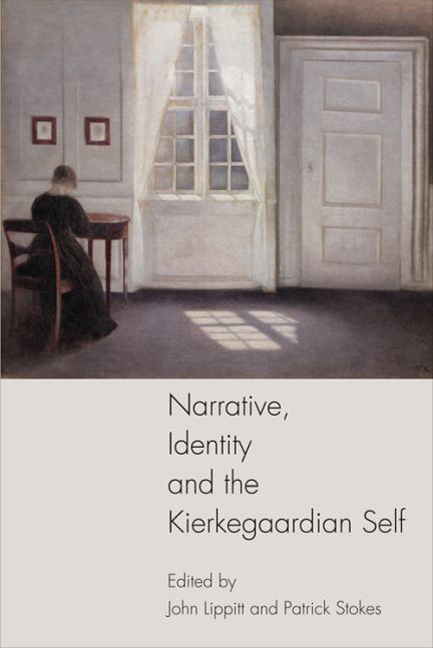Book contents
- Frontmatter
- Contents
- Acknowledgements
- Abbreviations
- Contributors
- Introduction
- 1 The Moments of a Life: On Some Similarities between Life and Literature
- 2 Teleology, Narrative and Death
- 3 Kierkegaard's Platonic Teleology
- 4 Narrative Holism and the Moment
- 5 Kierkegaard's Erotic Reduction and the Problem of Founding the Self
- 6 Narrativity and Normativity
- 7 The End in the Beginning: Eschatology in Kierkegaard's Literary Criticism
- 8 Forgiveness and the Rat Man: Kierkegaard, ‘Narrative Unity’ and ‘Wholeheartedness’ Revisited
- 9 The Virtues of Ambivalence: Wholeheartedness as Existential Telos and the Unwillable Completion of Narravives
- 10 Non-Narrative Protestant Goods: Protestant Ethics and Kierkegaardian Selfhood
- 11 Narrativity, Aspect and Selfhood
- 12 The Senses of an Ending
- 13 The End? Kierkegaard's Death and its Implications for Telling his Story
- Bibliography
- Index
7 - The End in the Beginning: Eschatology in Kierkegaard's Literary Criticism
Published online by Cambridge University Press: 15 September 2017
- Frontmatter
- Contents
- Acknowledgements
- Abbreviations
- Contributors
- Introduction
- 1 The Moments of a Life: On Some Similarities between Life and Literature
- 2 Teleology, Narrative and Death
- 3 Kierkegaard's Platonic Teleology
- 4 Narrative Holism and the Moment
- 5 Kierkegaard's Erotic Reduction and the Problem of Founding the Self
- 6 Narrativity and Normativity
- 7 The End in the Beginning: Eschatology in Kierkegaard's Literary Criticism
- 8 Forgiveness and the Rat Man: Kierkegaard, ‘Narrative Unity’ and ‘Wholeheartedness’ Revisited
- 9 The Virtues of Ambivalence: Wholeheartedness as Existential Telos and the Unwillable Completion of Narravives
- 10 Non-Narrative Protestant Goods: Protestant Ethics and Kierkegaardian Selfhood
- 11 Narrativity, Aspect and Selfhood
- 12 The Senses of an Ending
- 13 The End? Kierkegaard's Death and its Implications for Telling his Story
- Bibliography
- Index
Summary
INTRODUCTION
The controversy over the role of narrative in Kierkegaard's philosophy concerns whether it is desirable for a self to be able to produce some kind of life-narrative. Anthony Rudd, extending the work of Marya Schechtman in The Constitution of Selves, insists that while lives have unity beyond the explicit narratives we tell, we should be able to provide articulated narratives when asked (Rudd 2012: 180, 205; Schechtman 1996: 113–19). John Lippitt has argued, on the other hand, that an important feature of selfhood is the recognition that life resists narrative (2007: 45). In other words, Rudd claims it is ethically desirable for a person to shape her life into an implicit or explicit narrative, while Lippitt has raised doubts about the value of pursuing narrative unity (Lippitt 2007: 52).
I will propose a third way, showing that while Kierkegaard's theory of selfhood does include exhortations toward making coherent sense of one's life, these are always in the context of warnings against any cheap or easy unity. If Kierkegaard can rightly be said to advocate a kind of narrative unity in life, that narrative unity will not be as simple as being able to make sense of one's life or working to understand how one's past and future shape one's present. In order to show what is nevertheless important about narrative for Kierkegaard, I will take the notion of ‘narrative’ unity (a term not used by Kierkegaard, as Rudd notes) to mean ‘literary’ unity – something Kierkegaard does explicitly discuss, especially in his literary critical writings. In these texts Kierkegaard does say that there ought to be a certain kind of unity (a ‘life-view’), but his strongest reproaches are directed at works that have the wrong kind of literary unity – that is, a resolution that the reader simply cannot believe. I will suggest that John Davenport's ‘eschatological’ view more successfully balances Kierkegaard's emphasis on continuity of events through time with his admonitions against coherence too easily won. I will conclude that a self is better understood as a reader – that is, as a good literary critic – than as the author or narrator of her life.
- Type
- Chapter
- Information
- Narrative, Identity and the Kierkegaardian Self , pp. 113 - 125Publisher: Edinburgh University PressPrint publication year: 2015

